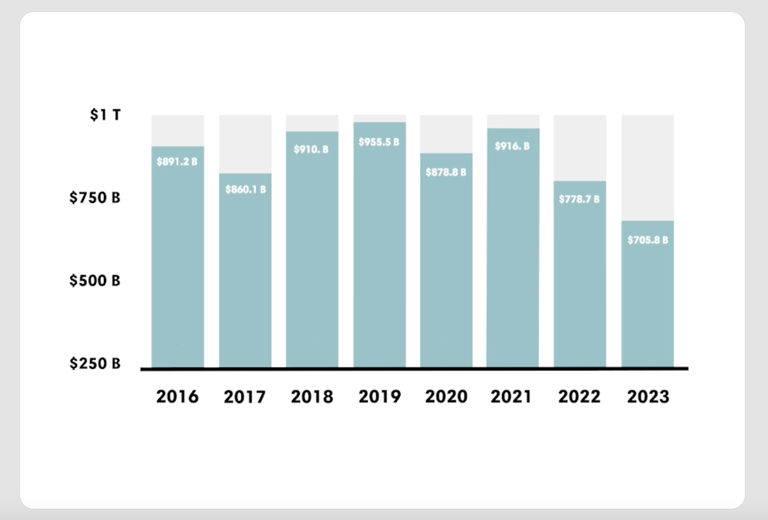https://www.lifegate.it/banking-on-climate-chaos-2023
- |
- The new Banking of climate chaos report has been released which analyzes the investments of the 60 largest banks in the world.
- As of 2023, more than $700 billion has flowed to fossil fuel companies.
- Among these banks, there are also Unicredit and Intesa San Paolo.
From the 2015 Paris Agreement to today, the 60 largest private banks in the world have financed the fossil fuels (such as coal, oil and gas) with 6,900 billion dollars.Nearly half of that – $3.3 trillion – went to fossil fuel expansion projects.In 2023 alone, banks invested $705 billion in fossil fuel financing, including $347 billion in expansion projects.
What the new Banking on climate chaos report says
This is the bleak picture painted by 15th report Banking on climate chaos (Bocc), drawn up by Rainforest action network, Indigenous environmental network, Banktrack, Center for energy ecology and development, Oil change international, Reclaim finance, Sierra club, and Urgewald and which analyzes the investments of 60 largest banks in the world to over 4,200 fossil fuel producing companies.
The ranking sees the American in first place JP Morgan Chase, followed by Japan's Mizuho and Bank of America.But there is no shortage of the Italians Intesa San Paolo and Unicredit.

The most “fossil” bank remains JP Morgan Chase
JP Morgan Chase is the primary financier of fossil fuels in the world, with a commitment of $40.8 billion to fossil fuel companies in 2023.They are also in first place in 2023, while Mizuho it jumped to second place in the report for both fossil fuel financing ($37 billion) and fossil fuel expansion financing ($18.8 billion).But the worst financier of fossil fuel expansion after the Paris Agreement is Citibank, which has provided $204 billion since 2016.
Recently, some banks have increased their exposure to climate risk by reducing their – already weak – policies. Bank of America, which ranks third in the 2023 ranking of the worst fossil fuel financiers, is a case in point:abandoned policies that excluded Arctic drilling and coal-fired thermal power plants, set no short-term absolute emissions targets, and abandoned the “Equator Principles,” a set of risk assessment guidelines social and environmental aspects of financial activities.In short, at the time of the report's publication, it is perhaps the bank that more than others demonstrates its willingness to "backtrack" on climate commitments.
Coal and gas, them again
But which fossil fuels does the banks' direct and indirect support focus on? Coal stands out, the “dirtiest” fossil fuel ever, which still absorbs a large part of direct fossil funding:It is primarily supported by Chinese banks (among the "dirtiest", Agricultural Bank of China and Bank of Communications).But there are also a handful of European banks, to be precise from Germany, the Netherlands, Spain and Denmark.There is a distinction to make here:because, while financing for thermal coal (the one used in power plants to generate electricity) decreases, support for it is growing metallurgical coal (the one used in steel mills) and to extraction mines.
But the fossil source that has recorded the greatest increase in financial commitment by banks is certainly the liquefied natural gas (LNG):+$120.9 billion, compared to last year, received largely from Mizuho, MUFG, Santander, RBC, and JPMorgan Chase.
Finally, among other fossils harmful to the environment, there are the tar sands, towards which much of the aid from Canadian banks is directed, including CIBC, RBC and Scotiabank, while Mitsubishi Ufj Financial Group (MUFG) has committed 512 millions of dollars for the companies that carry out offshore deep water drilling and JP Morgan Chase financed the fracking with 6 billion dollars.The top 60 banks by size of assets have financed, without restraint, practices harmful to sensitive biomes: UniCredit committed $265 million to companies involved in the drilling in the Arctic and Bank of America supported companies extracting oil and gas from the Amazon to the tune of $162 million.
Italian banks destroy the Amazon and the Arctic
As anticipated, there are also two Italian banks involved in the fossil fuel race: Intesa San Paolo and Unicredit.Overall, bank financing for the exploration and exploitation of oil and gas resources in the Arctic decreased in 2023.Nonetheless, some companies have identified new deposits, increasing their presence and relaunching drilling operations, especially in Norway.Among the main beneficiaries of financing for drilling activities in the Arctic in 2023, in addition to Aker BP, stands Vår Energi, previously known as Eni Norge, a subsidiary of Eni.Over the past eight years (2016-2023), major financial institutions investing in Arctic fossil fuel companies include JP Morgan with $3.6 billion, Citigroup with $3.5 billion, Crédit Agricole with 3.3 billion and Unicredit with 2.8 billion.However, considering only the investments of 2023, Unicredit stands out with a loan of 265 million dollars, followed by Citigroup with 246 million and by Intesa Sanpaolo with 210 million, thus confirming its leading role in this questionable ranking.
Even in the case ofAmazon, in addition to the "usual suspects" (JP Morgan, Citigroup, Bank of America and Deutsche Bank), the names of our Italian financial institutions stand out.Unicredit and Intesa Sanpaolo emerge as prominent investors in the multinationals responsible for the devastation of the Amazon biome:in 2023 alone, Unicredit allocated almost 2 million dollars to these investments, while over the last eight years it has invested 60 million.Intesa Sanpaolo has also invested 60 million in the last eight years, but there is no data available for 2023.

The loopholes according to the Banking of climate chaos analysis
Various credit and financial institutions, such as BNP Paribas, HSBC, Société Générale, Standard Chartered and indeed "our" Intesa Sanpaolo, declare that they have limited or suspended financing to companies involved in the extraction of oil and gas in the Amazon. It's a "loophole", since the definition of the Amazon biome adopted by this list of banks is much more restrictive than the one globally recognized, for example by the Amazonian Georeferenced Socio-Environmental Information Network (Raisg).
And banks adopt several similar loopholes:Although nine banks have added restrictions on fossil financing compared to 2022, only 36 out of 60 lenders have policies to limit gas, oil or coal.
But only three banks, for example, they really exclude coal from their investments:Unicredit, Banque Postale and Crédit Mutuel.
Other loopholes?Many bank policies that pay lip service to limiting fossil fuel financing often include exceptions for those companies with “credible transition plans.”A such vague terminology which leaves the door open for future loans or subscriptions to virtually any company in the sector that is part of the bank's portfolio.This is the case of UBS, which finances companies with a "transition strategy in line with the objectives of the Paris Agreement", without more precise specifications.Deutsche Bank and CaixaBank also adopt exceptions of this type.
The budget of Banking of climate chaos it is, therefore, very negative.But there is some light at the end of the tunnel:for example, last year only the state-owned French Banque Postale was highlighted as a good example.This year Danske Bank is added, rewarded by NGOs for its efforts in eliminating fossil fuels from investments.Furthermore, the number of banks willing to invest in projects involving the Amazon and the Arctic is decreasing.Finally, compared to previous years, 2023 is the year with the lowest share of fossil financing.And although these are still many, it is still little consolation.
